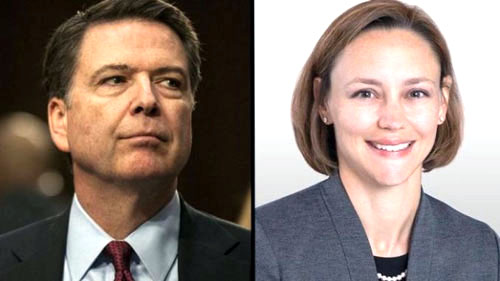by WorldTribune Staff, May 26, 2019
The FISA application for a warrant to spy on Trump campaign adviser Carter Page had been approved at the highest levels of the FBI and State Department prior to its submission, a move that a former top lawyer for the FBI described in congressional testimony as “unusual.”
Former FBI Deputy General Counsel Trisha Anderson, testifying before a joint session of the House Judiciary and Oversight committees on Aug. 31, 2018, said she was normally responsible for signing off on Foreign Intelligence Surveillance Act (FISA) applications before they reached the desk of her superiors for approval. Anderson said the “linear path” those applications typically take was upended in October 2016, with FBI Deputy Director Andrew McCabe and Deputy Attorney General Sally Yates signing off on the application before she did.

The publicly available Page FISA documents show then-FBI Director James Comey also signed off on it.
Anderson cast doubt on whether Comey would usually read a full FISA application, considering he could receive more than a dozen in a given day. “And so, yes, the director or deputy director, if he signs the FISA, you know, relies on others,” Anderson said.
Due to the unusual high-level involvement, Anderson said she didn’t see the need to “second guess” the FISA application.
Transcripts of Anderson’s testimony were released by Rep. Doug Collins, Georgia Republican.
The FISA application to surveil Page relied heavily on unverified research in British ex-spy Christopher Steele’s dossier.
Anderson said all FISAs need to be signed off on in the FBI’s National Security Law Branch, where she was assigned at the time.
In her testimony, Anderson stressed “in this particular case, I’m drawing a distinction because my boss and my boss’ boss had already reviewed and approved this application.” She emphasized “this one was handled a little bit differently in that sense, in that it received very high-level review and approvals — informal, oral approvals — before it ever came to me for signature.”
Anderson said that FISA approvals are typically “tracked in a linear fashion” and that someone in the Senior Executive Service “is the final approver on hard copy before a FISA goes to the director or deputy director for signature.” She said the Page FISA was approved outside regular procedures.
“Because there were very high-level discussions that occurred about the FISA,” Anderson said she believed that meant “the FISA essentially had already been well-vetted all the way up through at least the Deputy Director [McCabe] level on our side and through the DAG [Yates] on the DOJ side.” Yates had already signed the application by the time it made it to Anderson’s desk.
Because the FISA application had already been approved at such high levels, Anderson said she did not look at the Page FISA application with much skepticism. “I wouldn’t view it as my role to second-guess that substantive approval that had already been given by the Deputy Director [McCabe] and by the Deputy Attorney General [Yates] in this particular instance,” she said.
Asked why this FISA application was different, Anderson said she believed “the sensitivity level of this particular FISA resulted in lots of very high-level attention both within the FBI and DOJ.”
“The General Counsel [Jim Baker] … personally reviewed and made edits to the FISA, for example,” Anderson said. “The Deputy Director was involved in reviewing the FISA line by line. The Deputy Attorney General over on the DOJ side of the street was similarly involved, as I understood, reviewing the FISA application line by line.”
Anderson stressed that McCabe, Yates, and Baker all played key roles in reviewing the Page FISA. “My approval at that point was really purely administrative in nature. In other words, the substantive issues — the FISA had already substantively been approved by people much higher than me in the chain of command,” Anderson said.
Anderson said it “typically would not have been the case” that people such as McCabe and Yates would sign off on a FISA application before she did.
“That part of it was unusual, and so I didn’t consider my review at that point in the process to be substantive in nature,” Anderson said. “In other words, there were smart lawyers, high-level people on both sides of the street who had reviewed and signed off on the application, the details of the application. And so I was simply signaling, yes, this package is ready to go forward.”
Your Intel Brief: Geostrategy-Direct __________ Fix The Media Now
